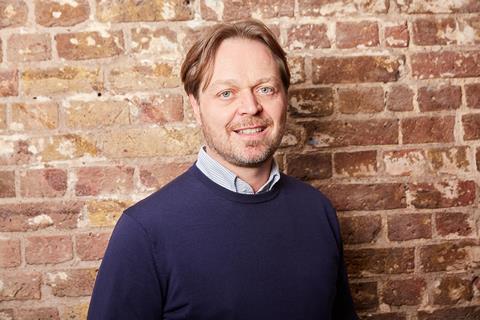
Will Clarke, co-CEO of sales and distribution outfit Altitude, has called for more homegrown feel-good comedies and genre films, saying “British audiences want to see British films”.
Clarke was giving the keynote address at Film London’s Production Finance Market (PFM), in conversation with Film London CEO Adrian Wootton, on October 7.
“There are not enough comedies in this marketplace,” said Clarke. “We used to have a flow of comedies – some of which didn’t work, but then you would have a Full Monty, Brassed Off or Four Weddings And A Funeral. You had adaptations of comedy shows like Ab Fab, Dad’s Army – all of these films took £8.5m to £15m.
“That feel-good British comedy – they don’t exist at the moment. We need more of those films in the marketplace, that people get some joy when they come to the cinema and see themselves.”
There are similar opportunities in horror, Clarke added, and in “making films out of the UK which are American-facing” – such as 47 Meters Down, the 2017 survival thriller produced by the UK’s Tea Shop Productions and sold by Altitude, which was made for $4m and took over $60m worldwide.
Clarke was optimistic about the UK industry, while acknowledging challenges. “I have spent the last couple of years crying into my cornflakes every morning, because it has been tough,” he admitted. “But what I’m seeing [now] is friends and colleagues in the industry doing well. Distribution is doing well. Production is difficult but there are opportunities.
“There’s money in the marketplace,” he continued. “Not much of it is coming from Britain. But there’s a lot of money from abroad. There are brands that are looking to get into the marketplace.”
He emphasised how well UK films such as Studiocanal’s Wicked Little Letters (£9.6m) and Warner Bros’ One Life (£10m) have performed at the UK box office.
“Certain films with a commercial focus, especially for an older audience, are working,” said Clarke.
Responding to a question about whether a small number of UK films made for “$15m and over” could bring box-office success, Clarke said, “Those are the films that sell, in terms of richness of production value and access to cast. A director who can deliver the promise of the script, and also a script that ticks all the boxes for a commercial film.
“We don’t have to compete with the [US] studios on this,” Clarke continued. “We can make very British content but make them with scale, make them with ambition. There’s a place for that, there’s a place in the independent marketplace. And the streamers want that.”
A younger audience is also turning up for the right titles, said Clarke, citing the Altitude-produced and sold Marching Powder, which grossed £3.1m for True Brit Entertainment in the UK. “The exit polls suggested [55% of the] audience was aged between 16-35, which is incredible. Danny Dyer is a middle-aged British guy – and the youth audience is going to see that film.
“I’m seeing young people coming back to the cinema to see classic movies – those films are over-indexing. There’s an opportunity to tap into that 16-35 audience.”
Clarke also reflected on his career of over 30 years in the industry, including founding Optimum Releasing with Danny Perkins and building it into a key UK producer and distributor, before selling to Studiocanal in 2010. “We sold at what I saw as the peak,” said Clarke. “We had a lot of suitors – Wild Bunch, BBC, ITV, Studiocanal and The Weinstein Company.”
Altitude, which Clarke founded in 2012 with Andy Mayson and Mike Runagall, produced three features in the last year: Marching Powder, Asif Kapadia’s documentary Kenny Dalglish, and Claudio Fah’s upcoming thriller Turbulence. “We do a lot, but I’ve still got that ambition to do more in the production space,” said Clarke.
UPstream strand
Following Clarke’s session, Film London executives Jordan McGarry and Helena Mackenzie outlined plans to bring UPstream, the showcase for early-stage projects from film, TV, games, podcasting, publishing and theatre, into the PFM via its own strand.
“UPstream has broadened the talent pool we work with in a really exciting way, allowing us to support a wider range of forms and voices, and to keep pace with what audiences want and industry needs right now,” said McGarry.
“We’ve got to listen to what industry is telling us, and to tap into where the next level of talent to be developed and supported is coming from,” said Mackenzie of the new strand.
“We’ve always innovated to stay relevant and this decision to widen out the PFM to include a greater range of creators and filmmakers is absolutely due,” added Wootton.
The day began with a brief address from BFI London Film Festival director Kristy Matheson, ahead of the opening of the festival’s 69th edition this week. Some 110 producers then met with 74 financiers across the two days of the PFM.
















![[L-R]: Amanda Villavieja, Laia Casanovas, Yasmina Praderas](https://d1nslcd7m2225b.cloudfront.net/Pictures/274x183/6/4/1/1471641_pxl_20251224_103354743_618426_crop.jpg)








No comments yet